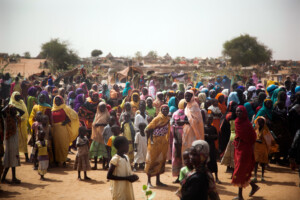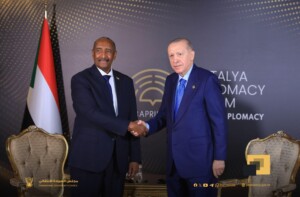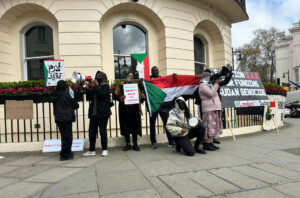Rebel delegation in Khartoum optimistic about Sudan peace talks
On Friday, Lt Gen Abdelfattah El Burhan, Chairman of the Sovereign Council, received a written message from South Sudanese President Salva Kiir Mayardit regarding the current negotiations for a comprehensive peace in Sudan. Negotiators of the armed movements are hopeful that the peace talks will soon be concluded.
 Lt Gen Abdelfattah El Burhan, Chairman of the Sovereign Council, receives South Sudan peace mediators and rebel leaders in Khartoum (SUNA)
Lt Gen Abdelfattah El Burhan, Chairman of the Sovereign Council, receives South Sudan peace mediators and rebel leaders in Khartoum (SUNA)
On Friday, Lt Gen Abdelfattah El Burhan, Chairman of the Sovereign Council, received a written message from South Sudanese President Salva Kiir Mayardit regarding the current negotiations for a comprehensive peace in Sudan. Negotiators of the armed movements are hopeful that the peace talks will soon be concluded.
Upon arrival on Thursday, South Sudanese mediator Dieu Mathok told reporters at Khartoum International Airport that the visit aims to discuss a number of outstanding issues in various files with Khartoum. “The mediation team felt that it could propose some ideas to the Sudanese government delegation that could cause a breakthrough in the remaining peace talks.”
Tut Galuak, head of the South Sudanese mediation team, handed the letter to El Burhan on Friday.
After the meeting, Galuak told reporters that they decided to travel with a delegation of armed rebel movements to Khartoum for a two-day visit, to discuss outstanding issues, and to confirm that a comprehensive peace agreement will be achieved in the near future.
The initial signing of the peace accord will be in the South Sudanese capital Juba, where the negotiations are held. The remaining ceremonies will take place in Khartoum.
Talks in Khartoum
The negotiators of the rebel movements discussed the remaining power-sharing issues concerning membership of the Sovereign Council, the Council of Ministers, and the Forces of Freedom and Change, with the authorities in Khartoum.
After their meeting with Lt Gen Mohamed Hamdan ‘Hemeti’ at his home in Khartoum on Friday, Ahmed Tugud, Chief negotiator of the Justice and Equality Movement reported progress on the “few remaining issues”.
During the indirect talks via teleconferencing because of the Covid-19 crisis, many peace files were dealt with, he said in a press conference at the premises of the Sudan News Agency (SUNA). Yet, there remained a limited number of issues that needed “direct political decision-making”.
According to Yasir Arman, deputy head of the Sudan People’s Liberation Movement-North faction under the leadership of Malik Agar (SPLM-N Agar), the meetings in Khartoum confirmed “the strong possibility for achieving peace in Sudan”.
He denied rumours that the negotiations are about quotas at the various government levels, and expressed his hope that the June 30 commemoration marches will be “the beginning of a broad rational dialogue between all political components and civil society in Sudan”.
Khartoum and the Sudan Revolutionary Front (SRF) rebel alliance agreed in end April, that four seats will be added to Sudan’s Sovereign Council in favour of ‘the peace bloc’ of the Darfur armed movements.
Mohamed Bashir, Chief negotiator of the Sudan Liberation Movement faction headed by Minni Minawi (SLM-MM) said that their coming to Khartoum enhances trust between the negotiating parties. “We are optimistic about a solution for the outstanding issues,” he said.
Splits
In mid-May, the SLM-MM withdrew from the SRF alliance and formed a new rebel alliance under the same name ‘Sudan Revolutionary Front’. Minawi claimed that the mainstream SRF ignored his constant demands for structural reform within the group. The Justice and Equality Movement faction led by Bakheet Abdelkarim (aka Dabajo) joined the new alliance.
As for the SPLM-N faction under the leadership of Abdelaziz El Hilu in South Kordofan, the separately held peace negotiations reached a stalemate in December last year, as the rebel faction adhered to its long-standing position on self-determination. The talks resumed in mid-January, but no progress has been reported so far.
The mainstream SLM, led by Abdelwahid El Nur in Darfur withdrew from the SRF when the rebel alliance opted for a peaceful solution instead of continuing the armed struggle. El Nur says he will only join peace negotiations after Khartoum has restored stability and security in Darfur.
Radio Dabanga’s editorial independence means that we can continue to provide factual updates about political developments to Sudanese and international actors, educate people about how to avoid outbreaks of infectious diseases, and provide a window to the world for those in all corners of Sudan. Support Radio Dabanga for as little as €2.50, the equivalent of a cup of coffee.












 and then
and then